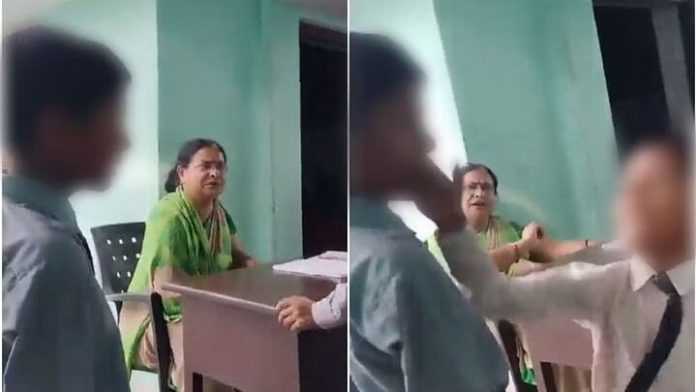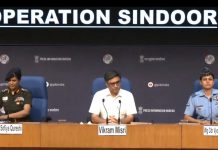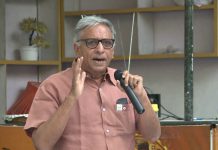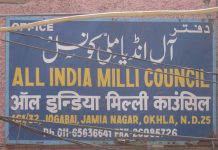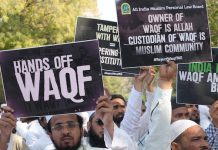In a Press statement the Members, Associates of All India Muslim Women Association stated that they are deeply disturbed by the recent incident that unfolded in a school in Muzaffarnagar, Uttar Pradesh, where a seven-year-old school-going child was subjected to a shocking act of hate crime and discrimination.
This distressing incident has evoked outrage from educationists, teachers, mothers, and Muslim women across the nation.
In an online meeting organized by the All India Muslim Women Association, attended by over 450 participants from various cities and districts expressed their collective concern.
Ms. Uzma Parekh from Nagpur highlighted that this heinous act is not just a local issue but a matter that impacts Muslim children across India. This incident starkly reflects the alarming extent of hatred that has infiltrated our society.
As responsible citizens and compassionate members of the community, we stand united in our empathy for the child and his family. Ms Hoda questioned the role of educators, who are the builders of our nation, in perpetuating discrimination based on religion. Such acts must be unequivocally condemned.
Ms. Misriya, a research scholar said the disturbing video of the incident serves as a reminder of the broader issue of assaults on individuals from the Muslim community, which regrettably remain a recurring concern. The incident reveals three significant aspects that demand our attention: 1. Communal Hatred, 2. Child Abuse, and 3. Status of Education.
It is disheartening that the poison of anti-Muslim hatred has infiltrated educational institutions.
Mrs. Sameera Shamsi, an educationist from Lucknow, stated that steps must be taken to ensure the protection of the Muslim community within the government institutions.
Most participants stated that schools should be sanctuaries of learning, devoid of communal biases. The role of educators extends beyond academics; it encompasses nurturing a safe and inclusive environment for every student. The incident’s impact on the child’s psychological well-being and future is deeply concerning, as emphasized by Dr. Mehtab. We must collectively address this trend, which poses a serious threat to our society’s fabric.
Ms. Wahida Syed, an educationist from Mumbai, highlighted that the child’s removal from school is not the solution. It is imperative that the teacher responsible is held accountable under the law. This incident merits unequivocal condemnation not only by the state and government but also by entities responsible for safeguarding child rights.
Dr. Asma Zehra, President of the Association, highlighted the broader context of communal tensions in Muzaffarnagar, referencing past incidents of violence and injustice faced by the Muslim community.
The psychological impact of such incidents on Muslim students within educational institutions is deeply troubling and requires immediate attention.
The media’s role in perpetuating stereotypes and targeting individuals based on their religious identity was stressed by Dr. Zebra. The relentless focus on outward symbols like hijabs, beards, skull caps, and Urdu names contributes to an environment of hostility and division. This is not just limited to political circles but has seeped into the consciousness of ordinary citizens, resulting in a toxic atmosphere of hatred.
In Muzaffarnagar Riots in 2013, 62 innocent muslims were killed & more then 100 women & girls were raped. Only two women could reach Supreme Court for justice,even that was denied.
Dr. Zebra emphasized that it falls upon the intellectual class to speak out against such incidents and condemn them unequivocally.
We are submitting memorandum to Human rights commission and National Commission for protection of child rights demanding justice for the victims.
She said that the protection and survival of the Muslim community should be a priority, and the initial steps toward achieving this involve speaking up, raising voices, writing, and spreading awareness.
It is disheartening that while politicians have offered their condemnation, many leaders and organizations still remain silent.
As educators, advocates, and concerned citizens, we believe that this issue transcends politics. It is a matter of social and humanitarian concern, one that poses a threat to the very fabric of our society and the future of our country. This incident underscores the need for collective action to foster understanding, unity, and inclusivity.
Advocate Zakia Moin, Vice President of association, remarked on the significance of teachers as leaders and role models for both students and society at large. In a nation where reverence for educators runs deep, the emergence of biased behaviour within the educated class, including teachers and doctors, is deeply distressing. Advocate Moin said this is our duty to raise our voices in concern, especially for underprivileged students in government schools who are particularly vulnerable to such scenarios.
Dr. Neelam Gazala, a senior educationist and principal with three decades of experience, expressed her profound shock, grief, and anguish on this incident. Dr. Gazala emphasised that students are not only the future of their community but also of our nation. The video evidence underscores the emotional and psychological toll this incident has taken on the child. It is not enough to merely voice our concerns; we must relentlessly pursue the case to ensure justice.
Mrs. Razia Rafat, an Associate Professor in the Department of Commerce at Osmania University in Hyderabad, described the incident as disgraceful and deeply unsettling. She noted that it is the responsibility of educators to uphold communal harmony, a sentiment that should extend even more so to the educated class. Mrs. Rafat lamented the incident’s potential to taint the sacred institution of learning, which should ideally be a bastion of enlightenment rather than a breeding ground for hatred.
In the face of this disheartening incident, it becomes imperative for us to raise our collective voices through various platforms. If we fail to do so, this incident serves as a stark reminder of the resounding message it sends to the community-a message of apathy and acquiescence in the face of injustice.
In conclusion, we reiterate our call for an inclusive and secure learning environment for all students, regardless of their background. This incident serves as a reminder of the critical need to foster understanding, empathy, and unity among our diverse communities.We urge the intellectual class, leaders, and organizations to join us in condemning such acts and taking concrete steps toward justice and equality.
The press release issued by the All India Muslim Women Association. Millat Times will not be responsible in any way for the content of this press release.

